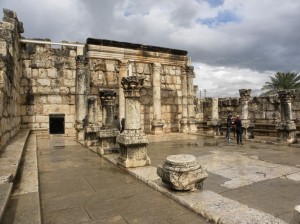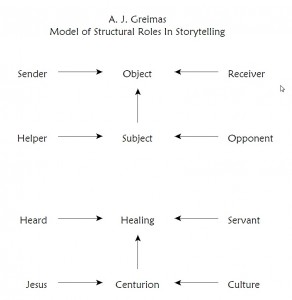March 20, 2011
Now when Jesus heard this, He marveled at him, and turned and said to the crowd that was following Him, I say to you, not even in Israel have I found such great faith.” Luke 7:9 (read 7:1-19)
INTRO: So many centuries have passed since the time of Jesus, it isn’t often that archeology can locate an exact spot that is mentioned in the gospels
– one of the exceptions is the synagogue in Capernaum
– the ruins of the structure you see there today was built on the site of the first century synagogue
Capernaum was a small fishing and agricultural village that sat on the shoreline of the Sea of Galilee
– I think living close to a body of water has a calming effect
– perhaps that’s one reason Jesus chose Capernaum for his “headquarters”
This serene scene is where the first story takes place
We will step into two stories:
- in the first story we meet an officer in a Gentile army
- in the second story we meet a widow whose only son has died
This general information is not especially noteworthy
– but when we turn back to Jesus’ speech in Nazareth, it suddenly becomes significant
“Truly I say to you, no prophet is welcome in his hometown” (Lk. 4:24-27)
– he then gave two examples:
- Elijah and a widow (whose only son was brought back to life through the prophet’s prayers, 1 Ki. 17:8-24)
- Elisha and an officer in a Gentile army (Naaman, 2 Ki. 5:1-14)
– Elijah and Elisha are both associated with working wonders
– at the conclusion of the two stories we look at today, Jesus is recognized as “a great prophet”
Few details are provided in the centurion’s and widow’s stories, yet lots of information is implied
I want to approach these stories with a question:
What does it take to move Jesus? (to impress him, touch his heart, get him to respond)
Verses 1-10
Jesus just finished delivering his longest recorded teaching in Luke
– he is mostly likely returning to Peter’s home in Capernaum to rest
– but on the way, he is met by a small delegation of local Jewish leaders
Their unusual request: would he please heal a centurion’s slave?
– Jesus is uncharacteristically quiet – he consents by simply going with them
“Centurion” was the rank of an officer in the Roman army
– this centurion had drawn duty in Capernaum
– while there, he became interested in the people, their culture, and their religion
This seems odd to me, but Jesus isn’t the hero in this story
– A. J. Greimas identified six roles characters play in a story
– he referred to the main character as the “subject”
That’s the role the centurion plays in this story
– perhaps that is one reason Jesus remains silent until the end
– he lets the centurion be the hero and does not try to take center stage
There are two underlying dynamics in the way this story unfolds that I want you to notice:
- The Jewish delegates claim that the centurion is “worthy” of being granted his request
– but two times the centurion protests that he is not worthy; neither to have Jesus enter his home, nor to come himself
– Jesus is not afraid of the social consequences of either sort of interaction with the centurion - The centurion is the source of activity within the story and that activity moves the plot
– the delegates were “sent” and then friends of the centurion were “sent”
– his ability to exercise his will and send people is the heart of story; it provides the basis for how he is able to understand what Jesus can do for him
The centurion says, in effect, “I understand, Jesus, how authority runs down chain of command, for I say to this one, ‘Go!’ and he goes, and to another ‘Come!’ and he comes . . .”
And now, the climax: Jesus “marveled” at the centurion
– so far, Jesus has been the one evoking amazement and astonishment
Don’t you think it would take something truly remarkable to impress Jesus?
If Jesus was looking for faith and was amazed by the faith he found in the centurion, then we want to read the story carefully to learn how to bring that same kind of faith to him
– later on, the disciples will ask Jesus, “Increase our faith!” (17:5)
– perhaps if they paid closer attention on this occasion they would have had it already
First, let’s be honest about what his faith did not entail:
- a huge religious commitment
– he may have believed in God, but he was not a convert to Judaism - theological training or education
– he had “heard about Jesus” – that’s it
– it’s not likely that he thought of Jesus in terms of titles such as “Messiah” or “Son of God”
– he did not connect with a title but with the Person - belonging to the insiders’ group
So what can we say about his faith?
- he was convinced that all he had to do was to get to Jesus
– Jesus would do the rest, the miracle - he reasoned from analogy
– he could see a parallel in his own situation
– always start there! Begin where you are and start your jouney with Jesus wherever you can
– God does not exclude himself from any human situation - he located his faith in Jesus’ word, “but just say the word, and my servant will be healed”
– he understood how words could exert power - he asked – he took the risk
– it isn’t faith until you act or ask – it’s merely belief
Jesus’ only spoken words in this story are in verse 9
– “not even in Israel” would include his own disciples (in the next chapter he will ask them, “Where is your faith?” 8:25)
Did you notice, Jesus did not speak a word of healing?
– no, “Go, for the servant is healed” (cf., Jn. 4:50)
– so the centurion’s logical conclusion from his knowledge of authority wasn’t one hundred percent
– Jesus did not even have to say the word
What does it take to move Jesus? Extraordinary faith
Verses 11-17
The stories are connected by “soon after” (or “the next day”)
– the two stories are meant to be considered together
The scene begins with two large crowds
– one leaving the city and one approaching the city
– at some point they intersected
The loss to the mother is greater than we can imagine
– naturally, there was the maternal bond and affection
– but in the first century Mediterranean world, mothers also depended on their sons for status in community
Bruce Malina, “This is the stereotypical ancient example of dire vulnerability: a widow whose only son has died. Since no family connection remained, such a woman’s life expectancy was extremely short. In antiquity the closest emotional bond was often between mother and son, not husband and wife; a son was a mother’s lifelong protector and her ultimate social security.”
Jesus instantly read what had happened and was immediately filled with compassion
– he speaks only two times in this story: first to the woman and then to her dead son
– it was not just the son that Jesus raised to life, for when the Lord gave him back to his mother, that was “the moment of her resurrection” (Malina).
Now we come to a big ending in verses 16-17, which echo Zacharias’ prophecy in 1:68 (see “visited His people” and “raised up”)
– the old priest was rejoicing in the anticipation of God breaking into history on Israel’s behalf
– that is what the people believed they witnessed when Jesus raised the dead to life
So what does it take to move Jesus?
– in this instance, we cannot say “extraordinary faith” – neither the mother nor the son displays any of the details of the centurion’s example
– hope and faith come to an end when the person we are praying for dies
What moved Jesus this time was not extraordinary faith, but extreme need
CONC: So now we have something of a paradox
Great faith is required to move Jesus
No faith is required to move Jesus
Jesus’ teaching and the NT contain many paradoxes
– you must lose your soul to win your soul
– you must humble yourself to be exalted
– “blessed are the poor”
Why?
- paradox prevents us from feeling like we’re in control
– paradox prevents us from mentally taking control of our relationship with God - paradox brings us face to face with mystery
– “To you it has been granted to know the mysteries . . .” 8:10
– to humbly stand before mystery is to be in reverence and awe (do Christians experience this any more?) - paradox frustrates the rational mind
– God cannot be figured out, placed into categories
– you either refuse what does not make rational sense to you, or you learn to accept such things as a peace that “surpasses understanding”
Instead of trying to solve the paradoxes that God presents to us, simply observe them
– be aware of both truths at once
What happens?
– your observation does not lead to a better rational understanding of God
– it leads to an experience of him
If you stay with the mystery, you learn that you don’t have God, he has you





 Daily Meditations From the Scriptures
Daily Meditations From the Scriptures